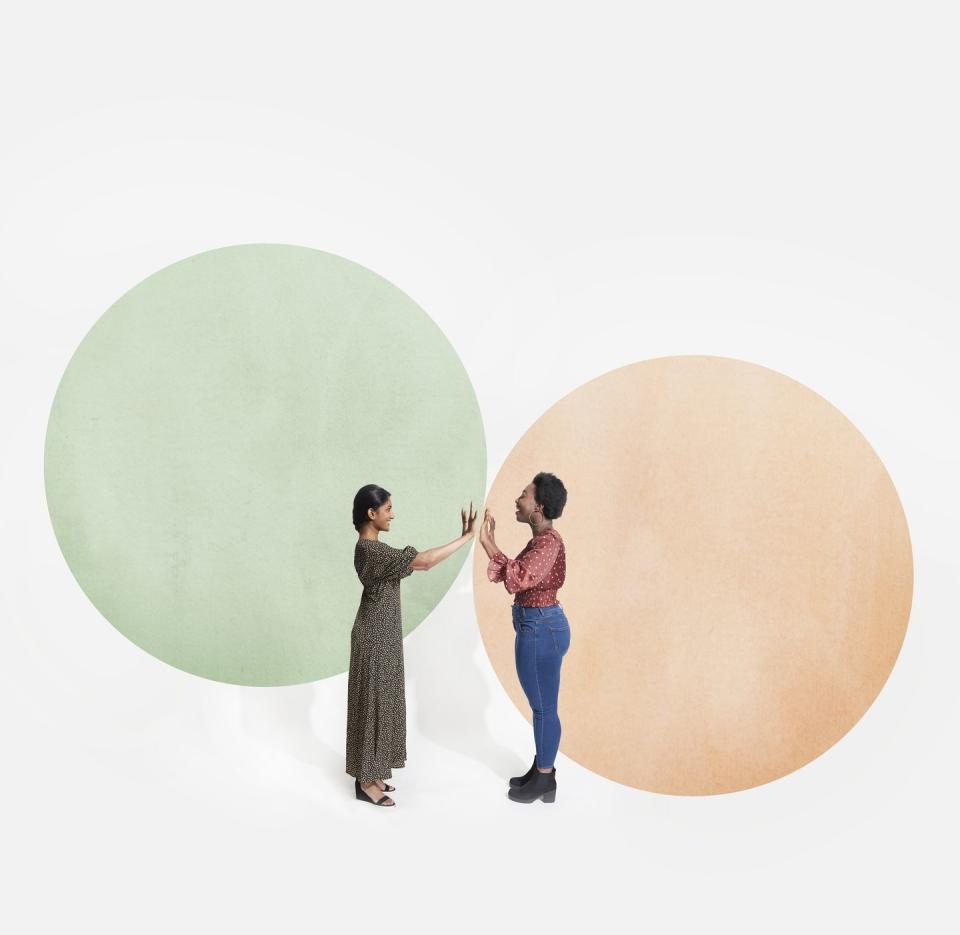9 signs a person is toxic – and what to do about it

The word ‘toxic’ is branded around a lot these days. In fact, give the term ‘toxic people’ a search on Instagram and you’ll be bombarded with over 637,000 posts.
It can be difficult to know if you’re involved with someone who is toxic - whether that's a romantic relationship or non-romantic. Often, it can feel confusing. However, Caroline Strawson, Trauma-Informed Therapist and Coach says that the warning signs that either your friend or partner is toxic can show up in many ways. “You just need to know what to look for and feel. When you listen to your body, it can give you many clues,” she says.
“Recognising that the relationship is unhealthy is the first step,” says Caroline. “Doing so may mean that the friendship ends or changes, with breadcrumbs of friendship seeming better than none. This is because we need connection as human beings, especially after the last few years.”

Caroline adds that toxic relationships become addictive with a cycle of a serotonin, dopamine and oxytocin rush when the relationship feels good and the cortisol and adrenaline rush when it’s toxic. “We can literally become addicted to this cycle of hormone release, as the body craves these types of friendships.”
Caroline adds that if you spot any of the common signs of toxic behaviour, you should choose an appropriate time to speak to your friend or partner about how you feel. You could even do this through couples therapy. “If they respond by projecting onto you, because it can be a difficult conversation, you will need to set some clear boundaries and decide whether you want this person in your life anymore,” Caroline says.
Is your friend or lover displaying any of these toxic symptoms? Here’s what to look out for and how to handle it, according to the experts.
1. They are judgemental and critical
“Friends who continuously judge and criticise you on your clothes, your music taste, your romantic relationships, your hair, your makeup (the list goes on), is a sign that your friend simply doesn’t like you for being you,” says Caroline. Although it can make you feel pretty down, Caroline explains that this is actually a sign of their deep insecurity.
“They print this onto you, so it makes them feel superior and in power but is not a healthy relationship dynamic. It can leave you second guessing every decision you make for fear of being judged by them. A true friend will love you simply for being the beautiful person you are.”
Dr Meg Arroll, Healthspan Chartered Psychologist says that we all say thoughtless or insensitive things from time-to-time, but if you find yourself becoming smaller and wilting in your friend or partner’s company, this is often a sign of a toxic dynamic.
Dr Arroll explains that the approach to tell if someone else’s behaviour is toxic, as opposed to triggered reactions related to deeper anxieties within the self, is to have an open conversation about the behaviour that is troubling, such as the critical comments. “Use first person terminology to avoid defensiveness such as, ‘when you said X it shut me down and made me feel that I couldn’t be myself with you’, and if your friend or loved one takes this on board in a genuine manner, rather than dismissing your concerns, it’s likely that the comment was simply careless rather than malicious and toxic.”
2. They gossip a lot
“A big red flag for toxic friendships is when your friend is constantly gossiping about everyone else to you, yet being nice as pie to their face,” says Caroline. “You can bet if they gossip about them, they will gossip about you. This can feed into your feeling of insecurity and needing to constantly be nice to this person for fear of them saying something mean about you.”

Caroline adds that this is a classic trait of a manipulative bully, subtly drawing you into their “web of toxicity” and it becomes a friendship based on fear, rather than love and kindness.
3. They gaslight you
Gaslighting, a form of manipulation, can be used to isolate you from other friends, by repeatedly making you feel like you are the one at fault, Caroline explains. “If you have a friend (or partner) that denies things that have happened and says sentences to you like ‘I never said that’, ‘you are too sensitive’ or ‘I was only joking’, the sirens should be going off,” she adds.
Essentially, it’s a big red flag if you can’t totally be yourself around your friend or lover, for fear of how they will react, as they will always turn it back on you. Caroline says you can feel like you are completely losing who you are. Again, an open conversation is needed, which can then help you decide if this person is worth keeping in your life.
4. They are dishonest
As Caroline says, any relationship based on dishonesty is not a healthy relationship. Whether it be a friend or a lover, consistently being dishonest can lead you to always wonder whether they are telling the truth or lying. “It can make you want to isolate yourself because you can start to feel that there must be something wrong with you if they aren’t telling the truth,” adds Caroline.

But you must remember that there is nothing wrong with you. “This is a sign of a toxic relationship; you must slowly start to extricate from this safely because until they do inner work, they will continue to lie and keep secrets.”
5. They are often angry
Anger is a normal emotion that many of us experience from time to time. However, as Caroline explains, a friend who is angry all the time can be totally energy-draining.
“If you find yourself feeling like you are walking on eggshells all the time in your relationship, this is a huge red flag. You can start to feel on edge all the time and not just with them, as it can spill out into the rest of your life as you become conditioned to try and minimise them feeling angry by fawning and people-pleasing in the hope that you can make them feel better.”
This has a big knock-on effect, as it can make you feel like you aren’t a good enough if your friend or partner is angry. “This highlights the inner work you need to do on understanding you are not on this planet to make others feel a certain way... It can be hard to move away from an angry friend as this can turn to rage so it can be a slow process of starting to set boundaries and minimise contact,” says Caroline.
6. It feels competitive
“Whether it’s the odd critical remark or just an underlying feeling of competitiveness, if a friend or lover isn’t able to celebrate you - and your successes - then they’re not a true partner,” says Dr Elena Touroni, consultant psychologist and co-founder of The Chelsea Psychology Clinic.
She adds that it’s necessary to have an open and honest conversation with your friend or partner. “If they shut it down or get defensive and blame you, then it may be necessary to distance yourself from them. Ultimately, relationships need to be a two-way street. Focus on taking care of yourself and surrounding yourself with people who truly value you.”
7. You’re left feeling drained after spending time with them
Ever walked away from time with a friend or partner, only to feel like the weight of the world is on your shoulders? Or that you are simply exhausted? “Toxic relationships will drain your energy. If you feel tired and less ‘yourself’ after hanging out with a friend or lover, this should be seen as a red flag,” says Dr Tourini. In cases like this, it’s wise to break away from the toxic person and spend time with people who give you energy instead; those who encourage you and make you feel uplifted.
8. They guilt trip you
It’s important to have a life away from your friend or lover. In fact, it’s part of a healthy relationship. However, Caroline says that if you have a friend that is guilt tripping you about seeing someone else, and this makes you feel guilty and bad for them, this is not a healthy relationship dynamic.

“Healthy people don’t feel threatened by others having other friends and seeing other people. They understand this is no reflection of them as a person,” Caroline explains. “A toxic friend will try and make you feel guilty with subtle remarks like, ‘don’t you want to see me then’ or ‘I thought I was going to do that with you!?’”
Eventually this can make you start to feel like second-guessing accepting invitations for fear of offending your friend or partner. Choose a good time to sit down, talk and explain how you feel and why this balance is healthy for any relationship.
9. They’re very negative
Perhaps a friend or lover is always negative about everything. “This can lead you to feeling drained and you can even start to mirror their negativity as you spend time with them,” says Caroline.
She adds: “We start to notice other friends and family don’t want to be around us because we are perpetuating that negative energy. They are negative because they have deep wounds of insecurity, and they see the world through a negative lens. It highlights the work they need to do as we are not born like this.”
To help deal with this toxic trait, Caroline explains that boundary setting is very important, “with the time you choose to spend with them and how you can direct the conversation”.
“Slowly but surely, remove yourself from these types of toxic relationships because until they acknowledge and take responsibility, nothing will change, and it is not your responsibility to try and make them see the positive. This will leave you exhausted and can even start to lead to illness as you remain hyper-vigilant, producing excess cortisol which is the stress hormone.”
Can a toxic person ever change?
Dr Arroll says that people exhibiting signs of toxic behaviour can indeed change, but they must be aware of their actions and words first. “They have to truly want to change, as this requires work – often difficult psychological work – and they must have the confidence that they can change and overcome toxic patterns that they have observed and modelled, often in early life when our relationship templates are formed.”
Meg adds that if you love this person, you can support them in their change, but we cannot change others. “Acceptance is key here - whether someone wants to change is their own decision; ours is whether to stay in this environment or make room for something that may be more nurturing.”

Caroline adds that “it’s OK to have a ‘friend cleanse’ as we evolve and grow as we get older”.
However, she says that if you keep attracting toxic relationships, some inner work may be needed to explore this cycle of attraction and why you feel the need to physiologically be in these types of relationships. “It is likely you will need to disconfirm past experiences and have corrective attachment experiences to relearn your sense of worth and how to create strong boundaries and stick to them.”
If you or someone you know is struggling with their mental health and wellbeing or has difficulty maintaining healthy relationships, speak to your GP, visit the NHS website for more information on relationship support or contact charities like Mind or Samaritans for mental health and wellbeing support.
If you or someone you know needs support for domestic abuse, visit the NHS website for up-to-date information on how to get support.
You Might Also Like

 Yahoo Sport
Yahoo Sport 






































